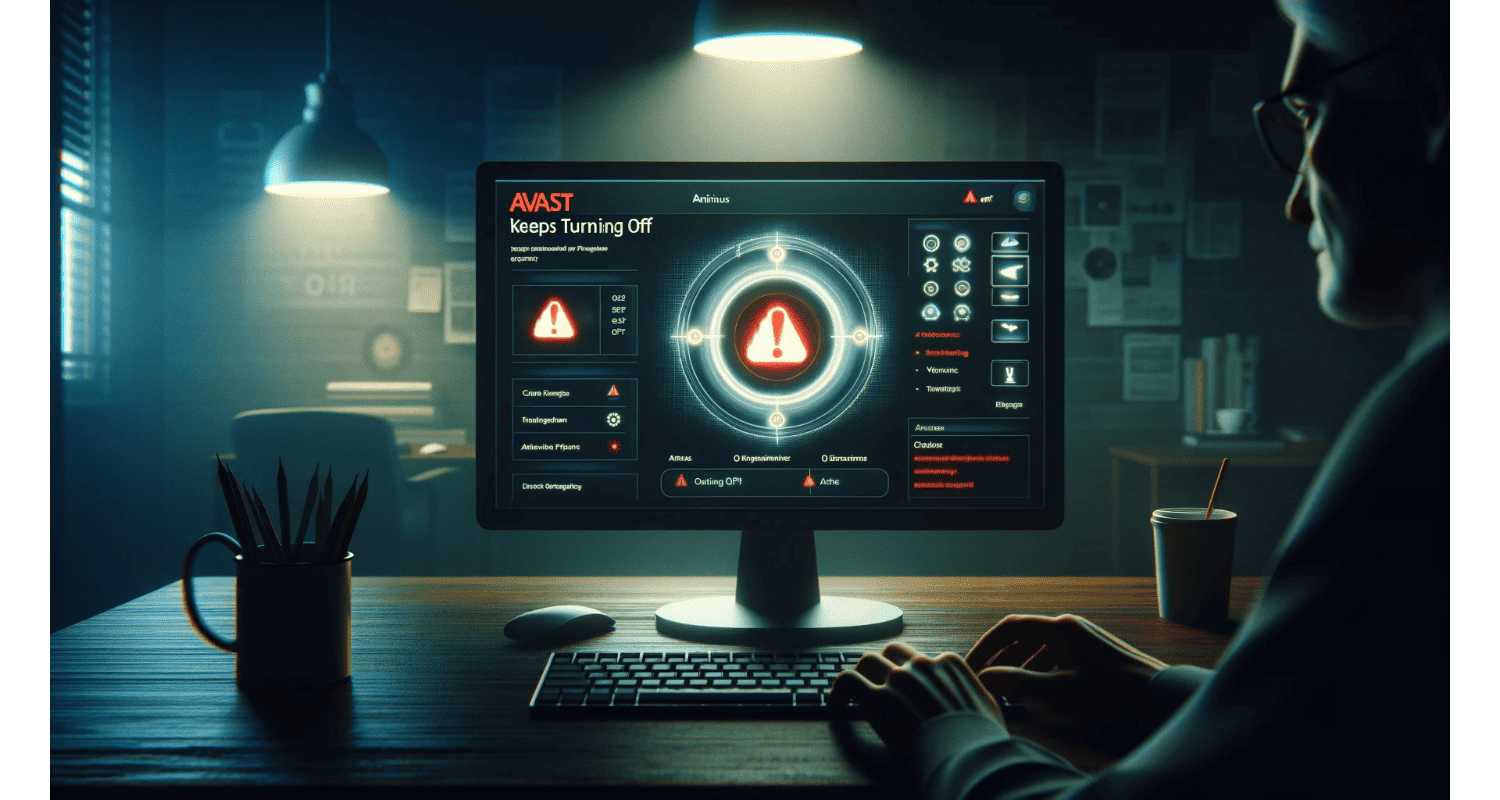Imagine a world where every click you make and every site you visit shows a potential digital threat. In this landscape, your security software stands as your unwavering guardian. Yet, what if this security suddenly falters, leaving you exposed and vulnerable? This is not just a hypothetical scenario but a reality for many who find their trusted antivirus, Avast, inexplicably shutting down or Avast keeps turning off.
If Avast keeps turning off, it’s likely due to software conflicts, outdated Avast versions, or system issues. Quickly resolve this by updating Avast, checking for any conflicting applications, and running a system scan to detect underlying problems. Ensuring Avast is up-to-date and conflict-free is crucial for continuous protection.
The stakes are high, and the risks are real for Avast keeps turning off. But fear not, for every problem has a solution. And in this case, the solution is simpler than you might think.
See Also: ONN TV Not Turning On But Red Light Is On? Here’s How To Fix It
Table of Contents
Understanding The Issue
Avast Antivirus is vital to guard against cyber threats in digital security. However, users frequently encounter a perplexing issue: the antivirus shutting down or becoming inactive unexpectedly. This malfunction is not just a minor hiccup; it’s akin to leaving the digital door ajar, exposing the system to potential cyber threats.
When Avast goes inactive, it’s not just an inconvenience; it’s a digital SOS. This lapse in protection can lead to various dire consequences. For instance, malware can infiltrate the system without active scanning, compromising personal data and system integrity. Additionally, this could lead to vulnerabilities in network security, making connected devices potential targets for cyberattacks to turn off Avast antivirus.
The impact of Avast’s inactivity extends beyond immediate malware threats. Hence, it can lead to problems such as data loss, identity theft, and even financial repercussions if sensitive information is accessed. Furthermore, for businesses, this can translate into significant economic losses and erosion of customer trust.
When antivirus software like Avast becomes inactive, it often leaves the system open to exploitation through various vulnerabilities. These can range from simple viruses to complex ransomware attacks, each carrying its own risks and potential damages to individuals and organizations.
Common Causes For Avast Turning Off
Here are some common causes for Avast turning off:
- Incompatible Software: One of the primary culprits behind Avast’s sudden inactivity is incompatible software. This scenario is like having two strong-willed leaders in a room; they struggle to coexist. When specific applications conflict with Avast, it can lead to the antivirus shutting down, leaving your system defenseless. So, for more details on resolving software conflicts, see how to remove incompatible software.
- Outdated Version: Running an obsolete version of Avast is akin to using an old map in a rapidly changing city. Performance issues are inevitable, as the antivirus may not be equipped to handle newer threats or integrate with updated system software, leading to its unexpected shutdown. Learn more about updating Avast and its benefits here.
- System Settings: Sometimes, the obstacle is within the system settings or permissions. These settings can inadvertently prevent Avast from running effectively if not configured correctly, like a misaligned lock blocking a key. This can result in Avast becoming inactive, even when it’s most needed. For a guide on configuring system settings for optimal antivirus performance, see this article.
- Malware: Viruses and malware are like digital ninjas, often sneaking in to turn off antivirus programs, including Avast. Hence, this is a deliberate tactic by malware to weaken the system’s defenses, making it easier to inflict damage or steal information without detection for turning off Avast antivirus.
Different Troubleshooting Methods And Fixes
How do I turn off my Avast antivirus? Below are the troubleshooting methods:
- Software Cleanup: The first method in troubleshooting is akin to digital housekeeping. Check for and uninstall any software that might be causing conflicts with Avast. This process involves reviewing installed applications and removing those known to have compatibility issues with antivirus programs as Avast antivirus turn off.
- Avast Version Upgrade: Keeping Avast updated is crucial when Avast keeps turning off. So, this step is like updating your armor in a battle. Check for the latest version of Avast and install it. This ensures that the antivirus can efficiently combat the latest threats and integrate seamlessly with your system’s current settings.
- System Optimization: Sometimes, it takes a few system settings and permissions adjustments. Hence, his step involves ensuring that Avast has all the necessary permissions to operate effectively and that no system settings inadvertently hinder its functionality.
- The Full Scan Strategy: Running a full system scan for malware or viruses is crucial. This process is like conducting a thorough search of your digital domain, rooting out any hidden threats that might have disabled Avast or pose potential risks to your system’s security.
See Also: Avast Keeps Scanning Visual Studio: How To Manage Settings
Advanced Troubleshooting Techniques
Below are some advanced troubleshooting methods:
- Reinstalling Avast Antivirus: Sometimes, the best solution is to start anew. Reinstalling Avast Antivirus can be compared to a reset button for your digital security. This process involves completely removing the current installation and installing a fresh version, ensuring all components are updated and free from corruption or conflicts. For a step-by-step guide on reinstalling Avast, check out this link.
- Utilizing Avast’s Repair Tool: Avast’s repair tool is like having an in-house mechanic for your antivirus. Hence, this feature is designed to diagnose and fix internal issues that might be causing Avast keeps turning off or Avast to shut down. It’s an efficient way to address problems without extensive technical knowledge.
- Checking Windows Services: Ensuring Avast services run correctly in Windows is akin to manning a watchtower. This step involves diving into Windows services, a hub that oversees various processes, to confirm that all Avast-related services are operational and set to run automatically.
Preventive Measures And Best Practices
Here are the preventive measures that one can take as Avast keeps turning off:
- Regular Software Updates: The digital world is constantly changing, and staying updated is critical. Regularly updating Avast and other software is like strengthening your digital immune system. Hence, it ensures that your antivirus is equipped with the latest tools to combat emerging cyber threats.
- Safe Installation Practices: One of the simplest yet most effective preventive measures is to avoid installing unverified or incompatible applications. This practice is akin to removing digital landmines that could harm your system’s security and stability.
- Regular Scans And Awareness: Regular system scans and staying vigilant about cybersecurity are the digital equivalent of a regular health check-up combined with a healthy lifestyle. Hence, it’s about proactively detecting threats and educating oneself about safe online practices to avoid potential risks.
See Also: Fixing Windows Defender Error 577: A Step-By-Step Approach
When To Seek Professional Help?
There are scenarios where the issue’s complexity with Avast Antivirus demands professional intervention. Hence, this is akin to recognizing when a medical condition is beyond home remedies. When repeated troubleshooting attempts fail, or if there’s a system-wide compromise, reaching out to Avast’s professional support team is wise.
How to turn Avast off temporarily? Contacting Avast support should be a well-prepared endeavor. Hence, it’s like calling in the cavalry; you need to be ready. So, this involves visiting Avast’s official support page, choosing the appropriate contact channel, and having detailed information about your issue, including error messages, system specifications, and a history of attempted fixes.
FAQs
Why does my Avast Antivirus keep turning off?
Avast Antivirus may turn off due to conflicts with other software, outdated versions, incorrect system settings, or malware infections. Identifying and addressing these issues can help restore its functionality.
How do I stop Avast from turning off?
To prevent Avast from turning off, ensure it's updated, remove conflicting software, adjust system settings for compatibility, and conduct regular malware scans.
Can Avast Antivirus run with other antivirus programs?
Running Avast alongside other antivirus programs can lead to conflicts and performance issues. It's recommended to use only one antivirus solution to avoid such problems.
What should I do if Avast Antivirus is not responding?
If Avast is not responding, try updating it, running its repair tool, checking your system settings, and scanning for malware. If issues persist, consider reinstalling Avast.
Is it safe to use a computer without Avast Antivirus?
Using a computer without Avast or antivirus software increases the risk of malware infections, data breaches, and cyber threats. It's essential to have an active antivirus program for protection.
Conclusion
To wrap up, troubleshooting Avast Antivirus when Avast keeps turning off involves several methodical steps. Each step plays a crucial role in restoring your digital shield, from identifying and addressing common causes like incompatible software and outdated versions to employing advanced techniques like reinstalling or using the repair tool.
In conclusion, the importance of a functioning antivirus is not more. It’s the digital guardian of your device, standing vigil against an ever-evolving landscape of cyber threats. Keeping Avast Antivirus up and running is not just a technical task. Hence, it’s a fundamental aspect of maintaining digital security and peace of mind.

Joe Fedewa, a Staff Writer at Automaticable, with nearly a decade of tech journalism experience. Former News Editor at XDA Developers, passionate about technology and DIY projects. Wrote thousands of articles, tutorials, and reviews, starting with Windows Phone coverage.

